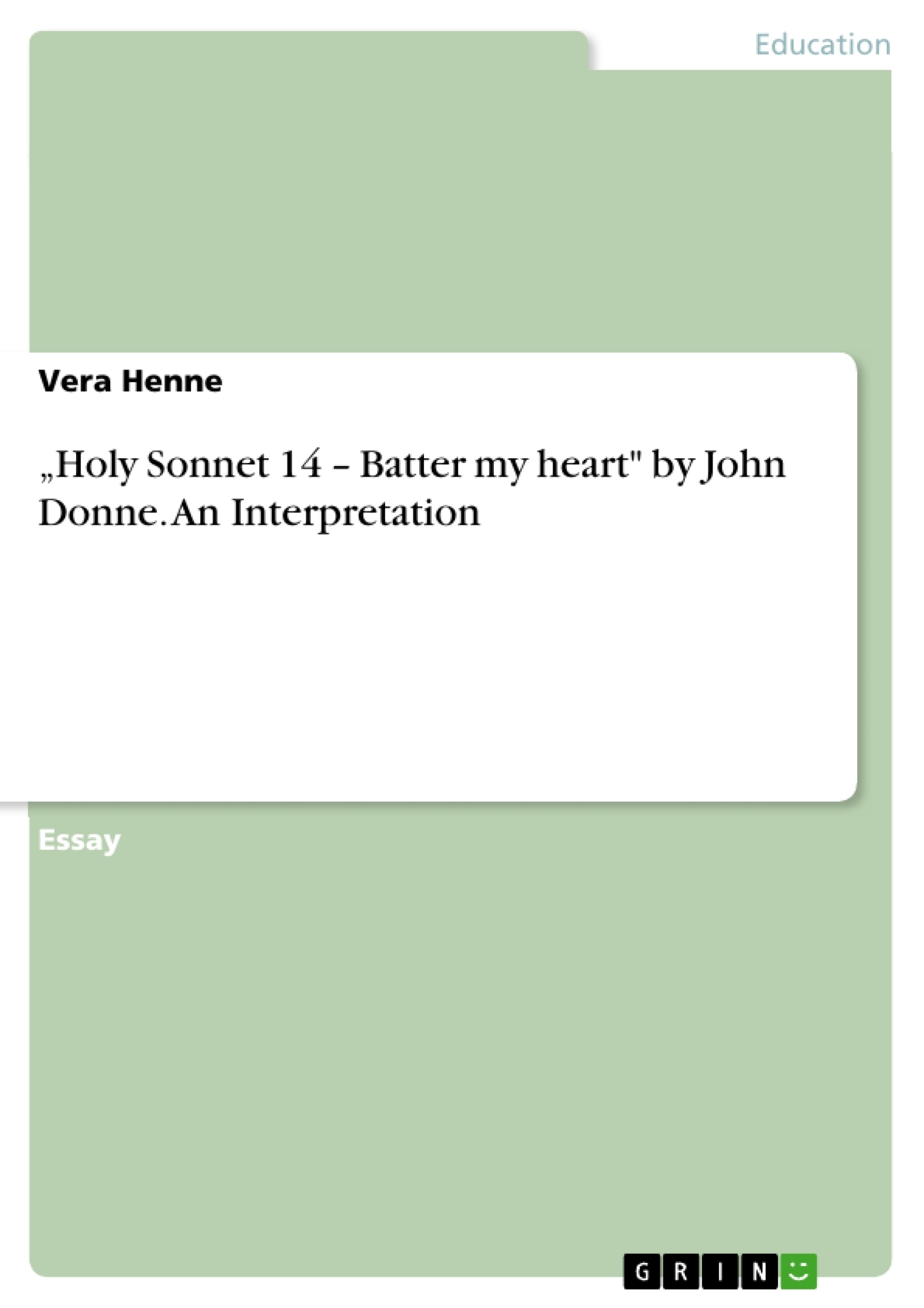This essay will show how the lyric persona in “Holy Sonnet XIV” fully self-abandons himself with help of various stylistic devices.
The 14th “Holy Sonnet” by John Donne, who lived from 1572 until 1631, was written around 1609, but it was not until after his death that his son published it in 1633. As one of the most acknowledged metaphysical poets, John Donne especially had a comeback by the publication of T.S Eliot’s essays “The Metaphysical Poets” and “Andrew Marvell” in 1921.
Table of Contents
- Interpretation of „Holy Sonnet 14 – Batter my heart, three person'd God; for, you“
Objectives and Key Themes
This essay analyzes John Donne's "Holy Sonnet XIV," exploring the speaker's complete self-abandonment to God through various stylistic devices. It examines the sonnet's structure, language, and imagery to reveal the speaker's complex emotional and spiritual state.
- The speaker's complete self-surrender to God.
- The use of war and love metaphors to depict the speaker's spiritual struggle.
- The sonnet's paradoxical and ironic language, characteristic of metaphysical poetry.
- The speaker's internal conflict between earthly desires and spiritual devotion.
- The Trinitarian framework of the sonnet.
Chapter Summaries
Interpretation of „Holy Sonnet 14 – Batter my heart, three person'd God; for, you“: This essay delves into John Donne's "Holy Sonnet XIV," focusing on the speaker's intense desire for complete submission to God. The analysis explores the poem's Petrarchan sonnet form and iambic pentameter rhythm, highlighting the intimate and direct address to God using informal language ("you," "your"). The essay examines the extensive use of metaphors, particularly those of warfare and forceful love, depicting the speaker's willingness to be "battered" and reshaped by God. The speaker's self-abasement and desperate yearning for spiritual transformation are explored through the analysis of key phrases, such as "batter my heart," "knocke, breathe, shine," and "breake, blowe, burn," showcasing the speaker's fervent desire for divine intervention to mend and remake him. The essay further analyzes the comparison of love and warfare, a common conceit in metaphysical poetry, interpreting it as a struggle between the speaker's earthly attachments and his spiritual longing. The poem's paradoxical and ironic elements are also examined to highlight the complex emotional and spiritual state of the speaker. The sonnet’s Trinitarian framework is explored through the direct address to the "three-person'd God," revealing the speaker's understanding and acceptance of the Christian doctrine of the Trinity. The essay concludes by suggesting that the speaker's passionate plea for divine intervention demonstrates his unwavering determination to achieve spiritual union with God, even if it requires complete self-abandonment and the overcoming of significant internal conflicts. The analysis reveals the speaker's profound yearning for a reciprocal love from God, highlighting the poem's intense emotional and spiritual depth.
Keywords
John Donne, Holy Sonnet XIV, Metaphysical Poetry, Religious Poetry, Self-Abandonment, God, War Metaphor, Love Metaphor, Paradox, Irony, Trinity, Spiritual Struggle, Self-Destructive, Obsequious, Wit, Conceit.
FAQ: John Donne's "Holy Sonnet XIV" - A Comprehensive Analysis
What is the main focus of this essay?
This essay provides a detailed analysis of John Donne's "Holy Sonnet XIV," focusing on the speaker's intense desire for complete submission to God. It explores the poem's use of stylistic devices, imagery, and structure to reveal the speaker's complex emotional and spiritual state.
What are the key themes explored in the essay?
The essay examines several key themes, including the speaker's complete self-surrender to God; the use of war and love metaphors to depict the speaker's spiritual struggle; the sonnet's paradoxical and ironic language; the speaker's internal conflict between earthly desires and spiritual devotion; and the Trinitarian framework of the sonnet.
How does the essay analyze the sonnet's language and style?
The analysis delves into the poem's Petrarchan sonnet form and iambic pentameter rhythm. It highlights the intimate and direct address to God, examining the extensive use of metaphors (warfare and forceful love) and key phrases ("batter my heart," "knocke, breathe, shine," "breake, blowe, burn") to illustrate the speaker's fervent desire for divine intervention.
What is the significance of the war and love metaphors in the sonnet?
The essay interprets the comparison of love and warfare as a struggle between the speaker's earthly attachments and his spiritual longing. This is a common conceit in metaphysical poetry.
How does the essay address the paradoxical and ironic elements of the poem?
The analysis examines the poem's paradoxical and ironic elements to highlight the complex emotional and spiritual state of the speaker, showcasing the internal conflict and the speaker's yearning for spiritual transformation.
What is the role of the Trinity in the sonnet's interpretation?
The sonnet's Trinitarian framework, highlighted by the direct address to the "three-person'd God," is explored, revealing the speaker's understanding and acceptance of the Christian doctrine of the Trinity.
What is the overall conclusion of the essay regarding the speaker's desire?
The essay concludes that the speaker's passionate plea for divine intervention demonstrates his unwavering determination to achieve spiritual union with God, even if it requires complete self-abandonment and overcoming significant internal conflicts. The analysis reveals the speaker's profound yearning for a reciprocal love from God, highlighting the poem's intense emotional and spiritual depth.
What are the keywords associated with this analysis?
Keywords include: John Donne, Holy Sonnet XIV, Metaphysical Poetry, Religious Poetry, Self-Abandonment, God, War Metaphor, Love Metaphor, Paradox, Irony, Trinity, Spiritual Struggle, Self-Destructive, Obsequious, Wit, Conceit.
- Quote paper
- Vera Henne (Author), 2012, „Holy Sonnet 14 – Batter my heart" by John Donne. An Interpretation, Munich, GRIN Verlag, https://www.grin.com/document/341505




